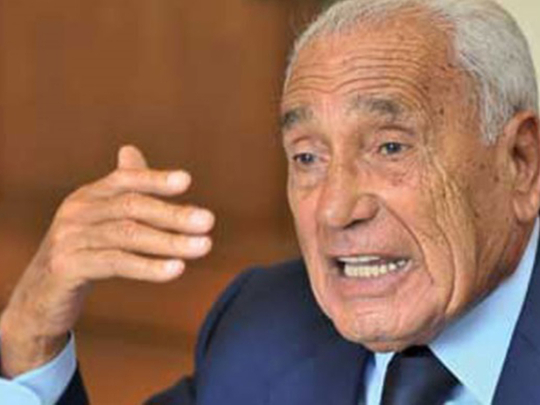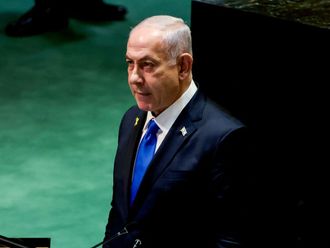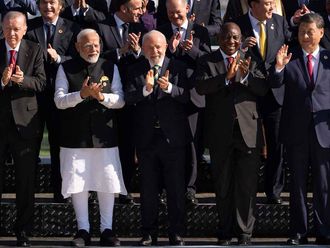
Cairo: Prominent Egyptian journalist and political commentator Mohammad Hassanain Haykal, who died on Wednesay aged 92, was a dominant voice in the Arab media and politics for decades.
Born in the province of Qaliubia in September 1923, Haykal launched an eventful career that spanned more than six decades during which he soared to professional fame and earned the venerating title of ‘Ustaz’ or the master.
Educated at Cairo University, he started as a reporter in the English-language daily The Egyptian Gazette in 1942. A year later, he joined the Arabic-language weekly Rose Al Youssef. At the age of 28, he became editor of the illustrated weekly Akher Saa for four years.
In 1956, he became the editor of the daily Al Akhbar. A milestone in Haykal’s career and the history of the Egyptian press happened in 1957 when his long-time friend Jamal Abdul Nasser, Egypt’s then president, appointed him as editor of the flagship daily Al Ahram.
Under his stewardship, Al Ahram’s quality and status was so enhanced that it came to be known as the New York Times of the Arab world.
Haykal’s weekly front-page column “Frankly speaking” served as a guide to the policy of Egypt’s then leaders. His analytical pieces also increased the readership of Al Ahram whose popularity further widened due to its news scoops and stories by leading writers.
During his 17-year tenure in Al Ahram, Haykal built his image as Nasser’s confidant. Haykal was the ghost writer of Nasser’s speeches that propagated the charismatic Egyptian leader’s ideology of pan-Arabism. He also edited Nasser’s book “Philosophy of the Revolution”.
Nasser was a young member of an army group called the ‘Free Officers Movement’ who deposed Egypt’s King Farouq and ended monarchy in the country. Nasser ruled Egypt for 16 years until his death in 1970.
In 1968, Haykal set up Al Ahram Centre for political and Strategic Studies, a semi-official think-tank that has since made a big name in the Arab analytical politics. Haykal also served as minister of information for several months in 1970.
After Nasser’s death, Haykal retained the editorship of Al Ahram. However, the paper’s critical pieces angered Anwar Al Sadat, who took office after Nasser. Soon, relations soured between the two. Haykal criticised Sadat for his shift of alliance from the then Soviet Union to the US. Haykal did not hide his displeasure with Sadat’s US-brokered negotiations with Israel, culminating in a peace deal between Cairo and Tel Aviv.
In 1974, Sadat removed Haykal from Al Ahram and appointed him a presidential advisor, a ceremonial post that Haykal immediately rejected. “The President can decide to remove me from Al Ahram. But where I go after this is up to me alone,” a defiant Haykal said at the time. “My decision is to devote myself to writing books.”
In the following years, Haykal authored many books and articles, which were published in many languages around the world. In 1978, he angered the Sadat administration when he published his book “Talk of the Initiative” focusing on Sadat’s controversial trip to Israel a year before. In response, Egyptian authorities barred Haykal from leaving the country and opened an inquiry with him allegedly for harming the country’s image in his writings.
After three-months of questioning, restrictions on Haykal’s movement were lifted and he was allowed to resume his frequent trips outside Egypt. Despite this, relations remained chilly between Sadat and Haykal. A month before his assassination by Islamist militants in 1981, Sadat detained Haykal along with hundreds of his opponents.
They were released by Husny Mubarak, who succeeded Sadat. After a long ban on Haykal’s books in Egypt, Al Ahram published in 1986 the first of his four volumes “The 30-year War: The Suez Files” about the Middle East conflict.
Signs of tensions in ties with the new president soon emerged due to Haykal’s criticism of Mubarak’s socio-economic policies and political leanings. As a result, the veteran journalist, a friend of many press barons and politicians around the world, was unofficially banned from the state media and became a target of smear campaigns in the semi-official newspapers.
In 2002, he briefly presented an analytical programme on the private Egyptian broadcaster Dream TV. The show was halted reportedly under pressure from Mubarak.
For several years starting from 2007, he hosted on the Qatari television Al Jazeera a series of lectures on the world events titled ‘With Haykal: A life experience”.
After Egypt’s 2011 uprising, Haykal kept a high profile in the local media and public events. He was an outspoken critic of the Muslim Brotherhood and affiliated president Mohammad Mursi.
Haykal also backed the army’s 2013 overthrow of the army led at the time by Abdul Fattah Al Sissi. He staunchly espoused Al Sissi’s presidential bid, calling him a “president of inevitability”—citing his ability to end the country’s political turmoil and economic decline. Hayakl met Al Sissi several times before and after the strongman took office in mid-2014.
In the past two years, Haykal hosted a string of lectures about the Egyptian scene, titled “Where is Egypt standing? And Where to?” on private television station CBC. The last episode was aired on December 25.
Haykal was widely admired for his analytical mind, tenacious memory despite his advance in age and “far-sighted vision”—traits that have made him one of the Arab world’s most influential media figures.
His critics, however, accuse him of condoning “Nasser’s oppressive rule and military adventures” as well as allegedly being the “man of all seasons”.
He has to his name around 40 books, some in English including “Nasser: The Cairo Documents”, “The Sphinx and Commissar”, “Return of the Ayatollah”, Cutting the Lion’s Tail: Suez Through Egyptian Eyes”, “Secret Channels: Inside Story of Arab-Israeli Peace Negotiations”; ‘Autumn of Fury: Assassination of Sadat”, and “Illusions of Triumph: Arab View of the Gulf War”.
Haykal is survived by three sons and seven grandchildren.












